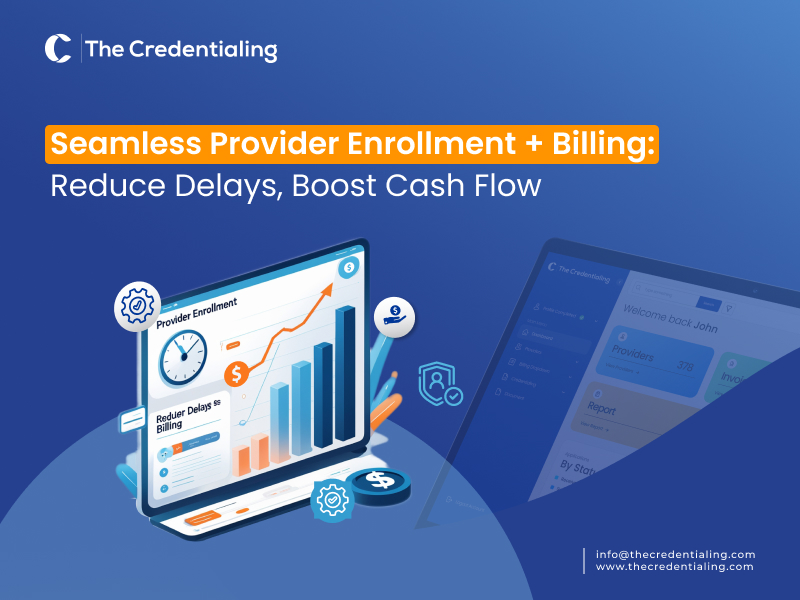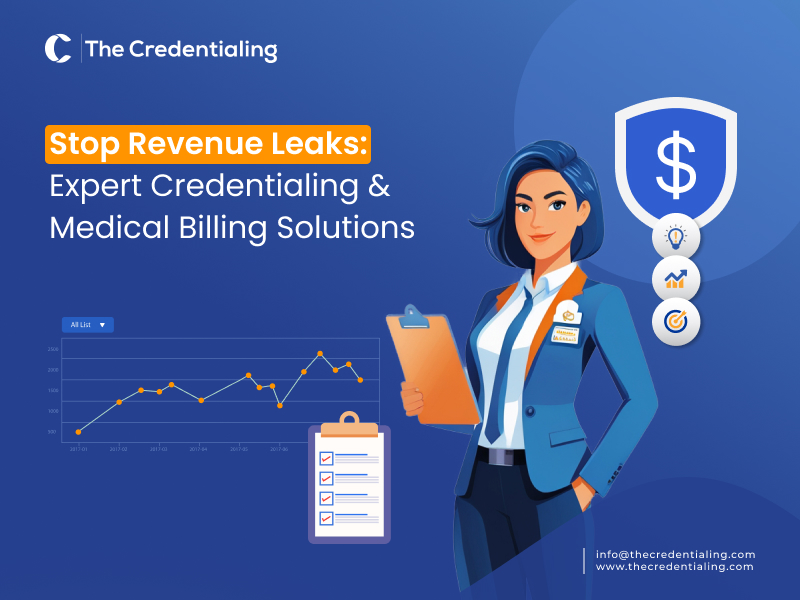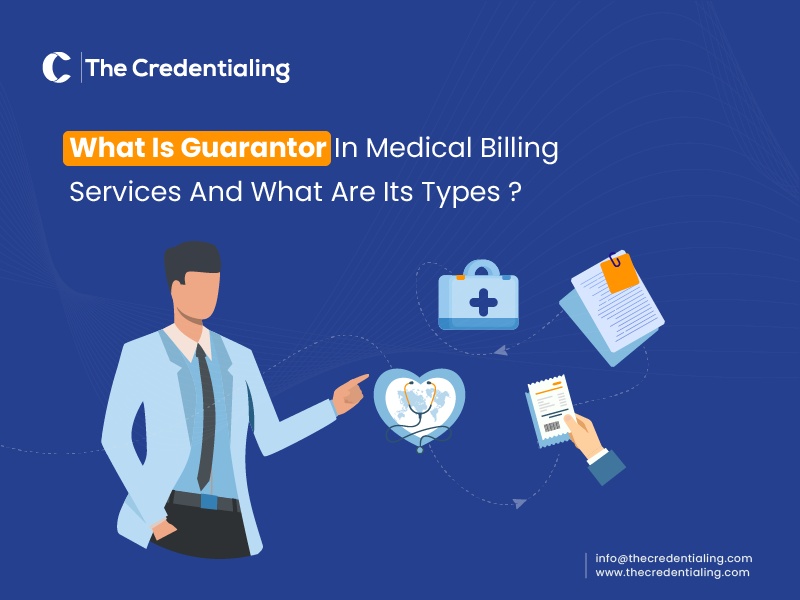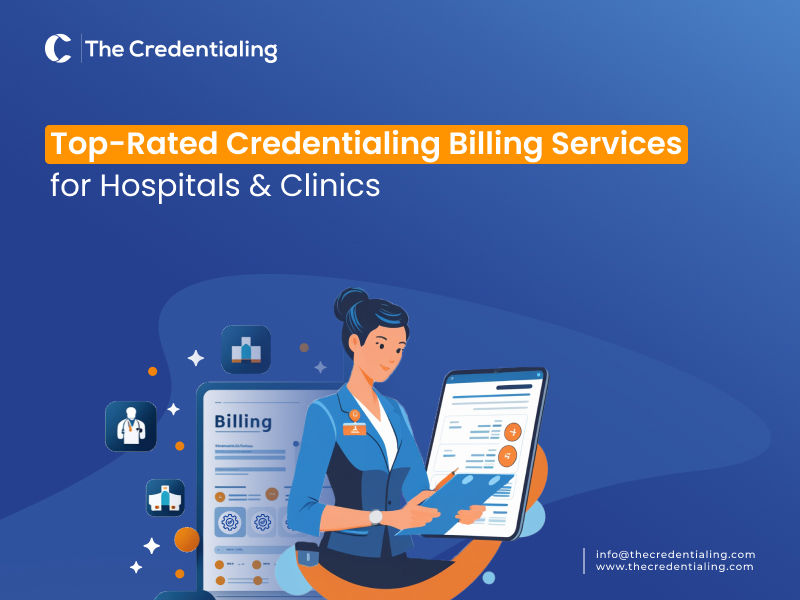Seamless Provider Enrollment + Billing: Reduce Delays, Boost Cash Flow
Optimize provider enrollment and billing to reduce delays and maximize cash flow. Streamline credentialing, minimize claim denials, and enhance revenue efficiency.
July 11, 2025

Provider enrollment and billing in healthcare are the key determinants of healthcare business and organization reputation. Yet, an effective application of the processes requires special attention, skills, and knowledge to ensure flawless billing, leading to successful revenue cycle management (RCM).
As per the 2025 Medallion report, 60% of C-level executives acknowledge that the sluggish enrollment practices adversely affect the practice revenue while causing 33% of organizations to face credentialing delays that last for almost 30 to 60 days. So, would you proceed with operations with compromises?
Stay ahead with key trend identification, and find out the flaws in billing and enrollment to have a safe bet! TheCredentialing Comprehensive Guide will let you learn about the critical role of the key processes and key tactics to keep improving billing operations with advanced tech efficiency. Let’s explore!
Medical Billing and Provider Enrollment: Understanding the Critical Link
The provider enrollment process is about verifying and registering healthcare providers with insurance companies so that they can be authorized to provide care, bill patients, and receive reimbursement for services delivered. With a slight difference, credentialing and enrollment are intertwining processes, whereas credentialing ensures the assessment of provider credentials, including licenses, qualifications, certifications, and the required criteria.
On the other hand, provider enrollment in medical billing ensures that the provider has joined the insurance network and has become a participating provider with the health plan as a result of the credentialing process for providers. All types of healthcare organizations require enrollment, such as hospitals, physician practices, and independent practitioners that are supposed to receive payment from third-party payers, such as Medicare and Medicaid. However, the process requirements have a slight difference as per the insurance, such as commercial and Medicare.
As for billing, enrollment plays a critical role in healthcare service delivery since the successful process enables the providers to generate and submit claims to insurance companies. In contrast, inefficient enrollment only leads the practice to delays. In other words, a provider is only permitted to bill patients when enrolled with insurance payers and has an active contract with payers.
Likewise, the credentialing provider enrollment also has certain requirements in terms of documentation from the insurance payer, as these authorities keep checking the status and recording the provider position in the process with each payer. However, following up on timely requests from insurance payers for additional information and correction is a must, as delays can become a major issue and lead providers to stop seeing patients.
The Impact on Billing and Revenue Cycle Management (RCM)
Medical billing in healthcare is the key component of the practice revenue cycle since it ensures that the providers are reimbursed fairly for the services delivered through the claims generation and submission to insurance payers. From patient registration to payment posting, the cycle tracks the revenue from patients and insurance companies. Yet, provider enrollment and credentialing are the keys since they define the provider’s ability to bill and receive payment from insurance companies.
Hence, the process has no room for inefficiencies or quality compromise. Any single error or delay in provider enrollment services can lead to denials and delayed payments that cause resubmissions. Consequently, it influences the practice of healthcare revenue cycle management.
Challenges in Provider Enrollment and Billing & Ways to Reduce Delays to Improve Cash Flow Efficiency
Provider enrollment in healthcare is an essential yet complex process filled with challenges for practitioners. Plus, the discrepancies in the process give way to issues in billing, considering the credentialing being the foundation. Since the efficiency of medical credentialing and billing is interdependent and payer enrollment has a direct impact on process billing, the challenges disrupt the billing process and, ultimately, the level of revenue. Below are the common concerns of careless provider enrollment.
Errors and Incomplete Enrollment Forms
Make sure a flawless and timely reimbursement relies on the correct and flawless enrollment in Medicare or private insurance plans. However, common errors in credentialing or incomplete enrollment forms pose challenges in the process of billing. On top of that, the delays last for months, hurting the practice's financial flow.
This also impacts the provider’s ability to see patients as delays increase the level of stress and frustration. So, the strategic way is to ensure accuracy in enrollment with any type of insurance plan you need to participate with. Complete your documentation and application with accurate provider information along with focusing on the deadlines to reduce reimbursement denials.
Failing to Comply With Regulatory Requirements
Amidst the critical realm of healthcare regulatory bodies in each process, including the payer enrollment, neglecting the state and federal compliance regulations may pose significant challenges. However, the practice’s frequent errors in providing doctors’ data or missing information is the leading cause of non-compliance that results in legal penalties, audits or even exclusions.
To avoid all the red flags, make sure that the provider fulfils all the required criteria to get enrolled with a certain insurance plan. For instance, ensuring updated licensure, certifications, and training standards as supposed by the regulatory bodies. In contrast, inaccuracy of data or outdated credentials will give way to significant scrutiny from the authoritative bodies such as the National Committee for Quality Assurance (NCQA) or the Joint Commission.
Increased Risk of Fraud and Abuse
If a healthcare provider is not or is incompletely enrolled, it can highly increase the risk of fraud from providers and third-party payers. For instance, providers with inadequate verification or enrollment are likely to create fraudulent claims that decrease the claim processing efficiency and similar geos with providers with a questionable background, like a revoked license status.
Take due caution in the process of enrollment to prevent fraudulent claims leading to an effective financial stage. Moreover, the carelessness of the healthcare organizations in credentialing and enrollment may expose the practice to legal issues as organizations may unknowingly enable fraudulent activities, including billing for non-provided services or extended costs.
Potential Impact on Patient Care
Not only on the billing, but a carelessly performed provider enrollment also disrupts the provider's ability to take care of their patients. Inefficiently enrolled providers may not be able to see patients, and it limits patient access to care. Consequently, the organization faces longer patient wait times, reduced appointment availability, and restricted resources.
In the worst-case scenario, an improperly credentialed provider increases the risk of patient safety as some patients come with chronic conditions requiring timely care. However, the discrepancies may lead to legal repercussions or even lawsuits.
Hence, the solution is to take initial care in the enrollment process because only properly performed enrollment can save the quality of care since enrollment ensures that the care is in qualified hands.
Reputational Damage to Providers and Healthcare Organizations
Although the management of a healthcare organization’s professionalism and competence is a must to stabilize the patient base and insurance credibility, careful credentialing and provider enrollment are more significant than all other billing steps. Issues like delays in provider enrollment, poorly managed credentialing data on provider data, or non-compliance with regulatory requirements may cause disruption, especially in terms of patient satisfaction.
Hence, to ensure your ability to increase patients who want to get with their preferred provider, have measures already in place to not experience the repeated problems. Maintain your practice's positive reputation with the effective utilization of digital domains such as social media. The digital edge can offer the advantage of good reviews, fewer complaints, and social media backlash as the organization’s reputation is the most rising factor in the current age.
Strategies to Reduce Delays and Improve Efficiency
Delays in payer enrollment are one of the most worrying factors for healthcare organizations and providers. Here are the key points to take into account:
Leverage Automation and Tech Support
- Use credentialing software that will automate routine tasks, reduce errors, and streamline the process.
- Automate application forms for faster turnaround times and improved accuracy.
Communication With the Consideration of Effective Steps
- Initiate the credentialing and enrollment earlier to avoid last-minute delays.
- Keep updating your credentials, including licenses, certifications, and track renewal.
- Ensure dedicated contact measures for clear payer communication on resolving issues.
- Get ready your thorough documentation with accuracy on top.
- Keep tracking your application status and follow-ups with payers to ensure timely approvals.
Streamline Enrollment Process With Key Steps
- Standardize your enrollment documentation by using consistent formats for data collection and submission.
- Organize payer information to streamline credentialing for different insurance companies.
- Centralize provider data with a database for provider information to ensure easy access and updates.
Consider Outsourcing With TheCredentialing
Outsourcing with credentialing experts like TheCredentialing is always a considerable thought. Make sure your practice has access to smart credentialing and enrollment with digital integration. TheCredentialing digital portal offers credentialing and enrollment efficiency with all types of credentialing, including Medicare, Medicaid, and commercial. From the compliance application,
TheCredentialing digital system will support every step of the process with efficiency, speed, and timely approvals. For instance, you can easily track your provider enrollment status along with the Medicaid provider application status.
Your Medical Billing Efficiency and Optimization Is Hidden in These Key Tactics
With the healthcare industry experiencing rapid transformation in operations, medical billing is no exception, following the key emerging tech trends. Many are the driving factors in reshaping how healthcare providers operate with the billing and RCM practices.
Advanced Automation and Artificial Intelligence (AI)
More than 71% of private firms in the healthcare industry are reported to prioritize AI and machine learning (ML) to transform clinical workflow. These systems automate many critical tasks in billing and effectively reduce manual errors to enhance operational efficiency.
Predictive Analytics to Provide Real-time Insights
With the sophisticated capabilities of AI and analytics tools and machine learning, professionals in billing have the convenience of analyzing vast data, identifying trends in revenue, and claiming performance. Moreover, these analytics systems present the predictive analytics of past claims so that the providers can realize what causes denials in the process. Such features offer efficient strategies to optimize practices and maintain the level of revenue.
Security and Privacy of Patient Data
With the rising inclusion of digital ventures, data breaches have also become a major concern for healthcare professionals. Cyber threats are increasing in diversity, effectiveness, and frequency. Hence, investing in security measures such as encryption and access control, and real-time detection is also a significant trend in medical billing.
Patient-centric Care Models
Amidst the healthcare industry’s trials of increasing claim denials, uninsured patients, and high costs, adopting patient-centric care models has become more than an option. With the traditional fee-for-service model, the providers are likely to accelerate payments due to hospital visits, procedures, and tests. A value-based care model requires the providers to receive payments determined by their care performance.
Remote Patient Monitoring (RPM)
The rise of telehealth in the healthcare industry has paved the way for RPM technologies to optimize the revenue cycle by improving care coordination and reducing hospital readmissions. Moreover, these technologies also ensure accurate reimbursement for remote healthcare services and enhance patient compliance with chronic disease management programs.
Outsource with TheCredentialing and Ensure Faster Growth in Reimbursement
Running a large medical billing practice is possible with the staff being experts in multitasking. Yet, your practice needs people who are dedicated to keeping a healthy healthcare business cash flow. Contact TheCredentialing is one of the best medical credentialing companies to have expertise in efficiently enrolling with any type of insurance. Grow your practice and patient base by having access to an extended insurance network.
Plus, these experts will keep your revenue in line with flawless billing and claim management when your practice is credentialed with the trusted providers. On top of that, with outsourcing to a reliable medical billing and credentialing partner like TheCredentialing, you will save time and confirm the accuracy of billing, leading to a healthy revenue.
Sit Back and Relax! Let The Pros Handle Credentialing For You!
thecredentialing has built a strong portfolio while providing credentialing services to clients over the years. Our service includes helpful features that you won’t find anywhere else.
Schedule Free Appointment Today!

